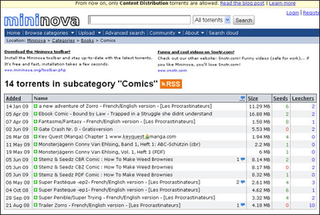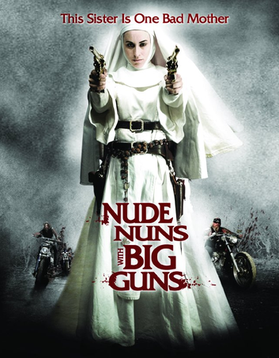Related Research Articles
BitTorrent is a communication protocol for peer-to-peer file sharing (P2P), which enables users to distribute data and electronic files over the Internet in a decentralized manner.

Mininova was a website offering BitTorrent downloads. Mininova was once one of the largest sites offering torrents of copyrighted material, but in November 2009, following legal action in the Dutch courts, the site operators deleted all torrent files uploaded by regular users including torrents that enabled users to download copyrighted material.

isoHunt was an online torrent files index and repository, where visitors could browse, search, download or upload torrents of various digital content of mostly entertainment nature. The website was taken down in October 2013 as a result of a legal action from the MPAA; by the end of October 2013 however, two sites with content presumably mirrored from isohunt.com were reported in media. One of them – isohunt.to – became a de facto replacement of the original site. It is not associated in any way with the old staff or owners of the site, and is to be understood as a separate continuation.
Stream ripping is the process of saving data streams to a file. The process is sometimes referred to as destreaming.
Arts and media industry trade groups, such as the International Federation of the Phonographic Industry (IFPI) and Motion Picture Association of America (MPAA), strongly oppose and attempt to prevent copyright infringement through file sharing. The organizations particularly target the distribution of files via the Internet using peer-to-peer software. Efforts by trade groups to curb such infringement have been unsuccessful with chronic, widespread and rampant infringement continuing largely unabated.

The use of the BitTorrent protocol for the unauthorized sharing of copyrighted content generated a variety of novel legal issues. While the technology and related platforms are legal in many jurisdictions, law enforcement and prosecutorial agencies are attempting to address this avenue of copyright infringement. Notably, the use of BitTorrent in connection with copyrighted material may make the issuers of the BitTorrent file, link or metadata liable as an infringing party under some copyright laws. Similarly, the use of BitTorrent to procure illegal materials could potentially create liability for end users as an accomplice.

TorrentFreak (TF) is a blog dedicated to reporting the latest news and trends on the BitTorrent protocol and file sharing, as well as on copyright infringement and digital rights.

Patrick Collins is an American heterosexual pornographic film producer–director, former owner of Elegant Angel Productions, and a member of the AVN Hall of Fame and the XRCO Hall of Fame.
File sharing is the practice of distributing or providing access to digital media, such as computer programs, multimedia, documents or electronic books. Common methods of storage, transmission and dispersion include removable media, centralized servers on computer networks, Internet-based hyperlinked documents, and the use of distributed peer-to-peer networking.
RapidShare was an online file hosting service that opened in 2002. In 2009, it was among the Internet's 20 most visited websites and claimed to have 10 petabytes of files uploaded by users with the ability to handle up to three million users simultaneously. Following the takedown of similar service Megaupload in 2012, RapidShare changed its business model to deter the use of its services for distribution of files to large numbers of anonymous users and to focus on personal subscription-only cloud-based file storage. Its popularity fell sharply as a result and, by the end of March 2015, RapidShare ceased to operate and it is defunct. As of 2017, Rapidshare AG was acquired by Kingsley Global.

Hotfile was a one-click file hosting website founded by Hotfile Corp in 2006 in Panama City, Panama. On December 4, 2013, Hotfile ceased all operations, the same day as signing a $4 million settlement with the Motion Picture Association of America (MPAA); the settlement had previously been misreported as $80 million.

Operation Payback was a coordinated, decentralized group of attacks on high-profile opponents of Internet piracy by Internet activists using the "Anonymous" moniker. Operation Payback started as retaliation to distributed denial of service (DDoS) attacks on torrent sites; piracy proponents then decided to launch DDoS attacks on piracy opponents. The initial reaction snowballed into a wave of attacks on major pro-copyright and anti-piracy organizations, law firms, and individuals.

Nude Nuns with Big Guns is a 2010 nunsploitation vigilante action film directed by Joseph Guzman and starring Asun Ortega, David Castro, and Perry D'Marco.
Prenda Law, also known as Steele | Hansmeier PLLP and Anti-Piracy Law Group, was a Chicago-based law firm that ostensibly operated by undertaking litigation against copyright infringement. However, it was later characterized by the United States District Court for Central California in a May 2013 ruling as a "porno-trolling collective" whose business model "relie[d] on deception", and which resembled most closely a conspiracy and racketeering enterprise, referring in the judgment to RICO, the U.S. Federal anti-racketeering law. The firm ostensibly dissolved itself in July 2013 shortly after the adverse ruling although onlookers described Alpha Law Firm LLC as its apparent replacement. In 2014, the ABA Journal described the "Prenda Law saga" as having entered "legal folklore".
Rightscorp. Inc is a Los-Angeles based copyright enforcement company, which locates alleged copyright violators and collects money from legal damages as well as out of court settlements on behalf of the copyright holder(s). Rightscorp manages copyrights of videos, music, and video games.

Hard Drive Productions, Inc. v. Does 1–1,495, Civil Action No. 11-1741 (JDB/JMF), was a United States District Court for the District of Columbia case in which the court held that anonymous users of the peer-to-peer file sharing service BitTorrent could not remain anonymous after charges of copyright infringement were brought against them. The court ultimately dismissed the case, but the identities of defendants were publicly exposed.

Popcorn Time is a multi-platform, free software BitTorrent client that includes an integrated media player. The application provides a piracy-based alternative to subscription-based video streaming services such as Netflix. Popcorn Time uses sequential downloading to stream video listed by several torrent websites, and third-party trackers can also be added manually. The legality of the software depends on the jurisdiction.
Mp3skull was a website that provided direct download links to MP3 files located on third-party sites. It was founded in 2010 and the site has been the subject of controversy for helping users to find unauthorized copies of copyrighted music.
Maverickeye UG is a copyright enforcement company that is based in Germany. It detects and retraces copyright infringement using software technology.

YIFY Torrents or YTS was a peer-to-peer release group known for distributing large numbers of movies as free downloads through BitTorrent. YIFY releases were characterised through their small file size, which attracted many downloaders.
References
- 1 2 3 4 5 Keegan Hamilton (August 10, 2011). "Porn, Piracy, & BitTorrent: The film industry mounts a sketchy legal strategy in response to illegal downloads". Seattle Weekly. Seattle, Washington: Village Voice Media. ISSN 0898-0845. Archived from the original on August 15, 2011. Retrieved August 14, 2011.
- 1 2 "New litigation campaign quietly targets tens of thousands of movie downloaders". The Hollywood Reporter. 30 March 2010.
- ↑ "Shlockmeister Uwe Boll sues 2,000 "Far Cry" P2P downloaders". ars technica. 31 March 2010.
- 1 2 3 "Bomb threat as US Copyright Group sues 2,000 more file-swappers". ars technica. 1 October 2010.
- ↑ "Court Orders US Copyright Group To Work With Time Warner, EFF To Craft More Informative Letter To Those Being Sued". Techdirt. 1 July 2010.
- ↑ "Judge "rejected all of the EFF's arguments" on P2P cases". ars technica. 1 July 2010.
- ↑ "U.S. Copyright Group 'Steal' Competitor's Website". TorrentFreak. 30 July 2010.
- ↑ Mennecke, Thomas (2010-09-29). "US Copyright Group and Web Sheriff Targeted in DDoS Attack". Slyck. Archived from the original on 2010-10-06. Retrieved 2010-10-23.
- ↑ Moore, Erika Jacobson (2010-09-30). "Investigators Track Leads In Bomb Threat At Leesburg Law Office". leesburg2day.com. Leesburg Today. Retrieved 2010-10-27.
- ↑ "Hurt Locker Makers Sue Lawyer Who Helped 'BitTorrent' Defendants". TorrentFreak. November 24, 2010.
- ↑ "Torrent users sue US Copyright Group for fraud and extortion". TechSpot.com. November 29, 2010.
- ↑ "US Copyright Group Drops Cases Against Thousands of BitTorrent Users". TorrentFreak. December 7, 2010.
- ↑ "ACS:Law and MediaCAT Completely Shut Down Both Their Businesses". TorrentFreak. 4 February 2011.
- ↑ "Former Bar chairman to prosecute anti-piracy partners". Solicitors Journal. 5 May 2011.
- ↑ "Do you download copyrighted porn? Lawsuits seek to reveal names". The Hollywood Reporter. 3 September 2010.